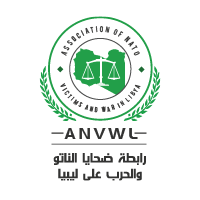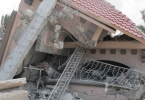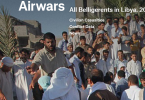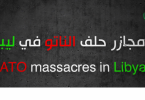In 2011 an Alliance bomber exterminated his family in Sorman, Libya.
Marinella Correggia | January 27, 2018 | Internationalist 360°
Speaking at the Rimini meeting in the summer of 2017, NATO Secretary General Jens Stoltenberg repeated several times that NATO works for peace and stability, with a shamelessness equal to the impunity enjoyed by the organization and its members.
To which NATO country did the bomber that exterminated the family of Khaled Al Hamedi on June 20, 2011 in Sorman, Libya belong?
“Only the NATO Alliance knows the country in question, and will not reveal it,” replies the Belgian lawyer Jan Fermon who represents Al Hamedi. The lifeless bodies of Khaled Al Hamedi’s pregnant wife, his children and other relatives and friends were removed from the rubble. Seven months – from March to September 2011 – the operation called ‘Unified Protector’, lasted in Libya, initiated thanks to the strategic use of false news and in the name of a new and instrumental international theory, the ‘responsibility to protect’. The joint actions of NATO from the sky and the “rebels”, its allies on the ground, certainly resulted in thousands of dead and wounded among civilians. Think of the siege against Sirte and Bani Walid, the destruction of Tawergha (a city of Libyans of African origin, killed or deported by the armies of Misrata), the sub-Saharan workers who vanished while others were found among the bodies of the dead caught in the vortex of racist violence.
In July 2011, Tripoli presented a list with over a thousand names of victims. The process of assessment and verification of civilian casualties was interrupted by the “rebels” taking power, who then sabotaged all body count efforts.
Material and moral damages suffered by almost all victims would not have recognition or compensation even if international justice actually worked, rather than exempt the powerful as it does. But at least for certain events, legal avenues can be utilized and Khaled Al Hamedi embarked on this path of legal struggle in 2012 – so far without success. He also created the NATO Victims Association (www.anvwl.com). The latest development was on November 23, 2017 when the Court of Appeal of Brussels (NATO is based in Belgium) responded negatively to the appeal of lawyer Jan Fermon: “The immunity of NATO has been confirmed. A lost opportunity for a great step forward in the application of international law on human rights and international humanitarian law. But we will go on.” To a Martian, the immunity of an organization that bombards and therefore has the power of life and death throughout the world might seem strange. But so its founders decided with the Ottawa Treaty of 1951.
Immunity is combined with silence, and Fermon can not therefore act against the unknown country responsible for the bombing operation on Sorman. Khaled Al Hamedi called for Article 6 of the European Convention on Human Rights, which provides for every citizen the right to access a court. A right, however, that may be subject to limitations, and the Court of Appeal reiterated it.
But would it not be able to raise the illegality of the NATO intervention in Libya, which went far beyond the dubious 1973 resolution of the Security Council that restricted the mandate to protect civilians?
“Yes,” the lawyer answers. “Launching such lawsuit on the political side makes things more difficult than if you stay on the ground of individual right. And then, even if the war were legal, the deliberate bombing of Sorman is still a war crime.”
So why not appeal to the International Criminal Court (ICC-CPI), however notoriously partial?
“The Security Council Resolution 1970, in effect, formally entrusted the ICC with all crimes committed in Libya; but it is very clear that it was aimed only at Gaddafi. And then, the prosecutor often does not even initiate the investigation. There are very strong pressures“.
Therefore Khaled will perhaps adhere to the European Court of Human Rights, or try again with Belgian justice. So far, all attempts made to try the winners of the wars of aggression (the “supreme international crime” according to the definition given at Nuremberg) when they are conducted by the NATO-Gulf Axis, have been useless.
At most, and not in many cases, there have been provisions for small compensation for the suffering of the “collateral damage” of war, the surviving victims – in Iraq, Afghanistan, Pakistan.
This is why, according to Jan Fermon, “the fight against impunity is above all a struggle by the peoples. It is political, even if it has to be translated into juridical principles“.
*This article first appeared in Italian in Il Manifesto
Read the Complete Interview: The Association Victims of NATO in Libya Fights Against Impunity of the Powerful
Source:







Dear Khaled I am the author of the article. It was well read in Italy! Everybody was moved by your action. We were ashamed of the war against Libya, it was terrible. Please let us know how to help the case of the Nato victims.